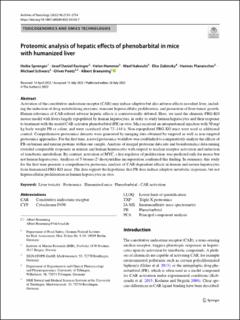Proteomic analysis of hepatic effects of phenobarbital in mice with humanized liver
Sprenger, Heike; Rasinger, Josef; Hammer, Helen; Naboulsi, Wael; Zabinsky, Elke; Planatscher, Hannes; Schwarz, Michael; Poetz, Oliver; Braeuning, Albert
Peer reviewed, Journal article
Published version

View/
Date
2022Metadata
Show full item recordCollections
- Articles [3009]
- Publikasjoner fra CRIStin [3056]
Abstract
Activation of the constitutive androstane receptor (CAR) may induce adaptive but also adverse effects in rodent liver, including the induction of drug-metabolizing enzymes, transient hepatocellular proliferation, and promotion of liver tumor growth. Human relevance of CAR-related adverse hepatic effects is controversially debated. Here, we used the chimeric FRG-KO mouse model with livers largely repopulated by human hepatocytes, in order to study human hepatocytes and their response to treatment with the model CAR activator phenobarbital (PB) in vivo. Mice received an intraperitoneal injection with 50 mg/kg body weight PB or saline, and were sacrificed after 72–144 h. Non-repopulated FRG-KO mice were used as additional control. Comprehensive proteomics datasets were generated by merging data obtained by targeted as well as non-targeted proteomics approaches. For the first time, a novel proteomics workflow was established to comparatively analyze the effects of PB on human and murine proteins within one sample. Analysis of merged proteome data sets and bioinformatics data mining revealed comparable responses in murine and human hepatocytes with respect to nuclear receptor activation and induction of xenobiotic metabolism. By contrast, activation of MYC, a key regulator of proliferation, was predicted only for mouse but not human hepatocytes. Analyses of 5-bromo-2′-deoxyuridine incorporation confirmed this finding. In summary, this study for the first time presents a comprehensive proteomic analysis of CAR-dependent effects in human and mouse hepatocytes from humanized FRG-KO mice. The data support the hypothesis that PB does induce adaptive metabolic responses, but not hepatocellular proliferation in human hepatocytes in vivo.